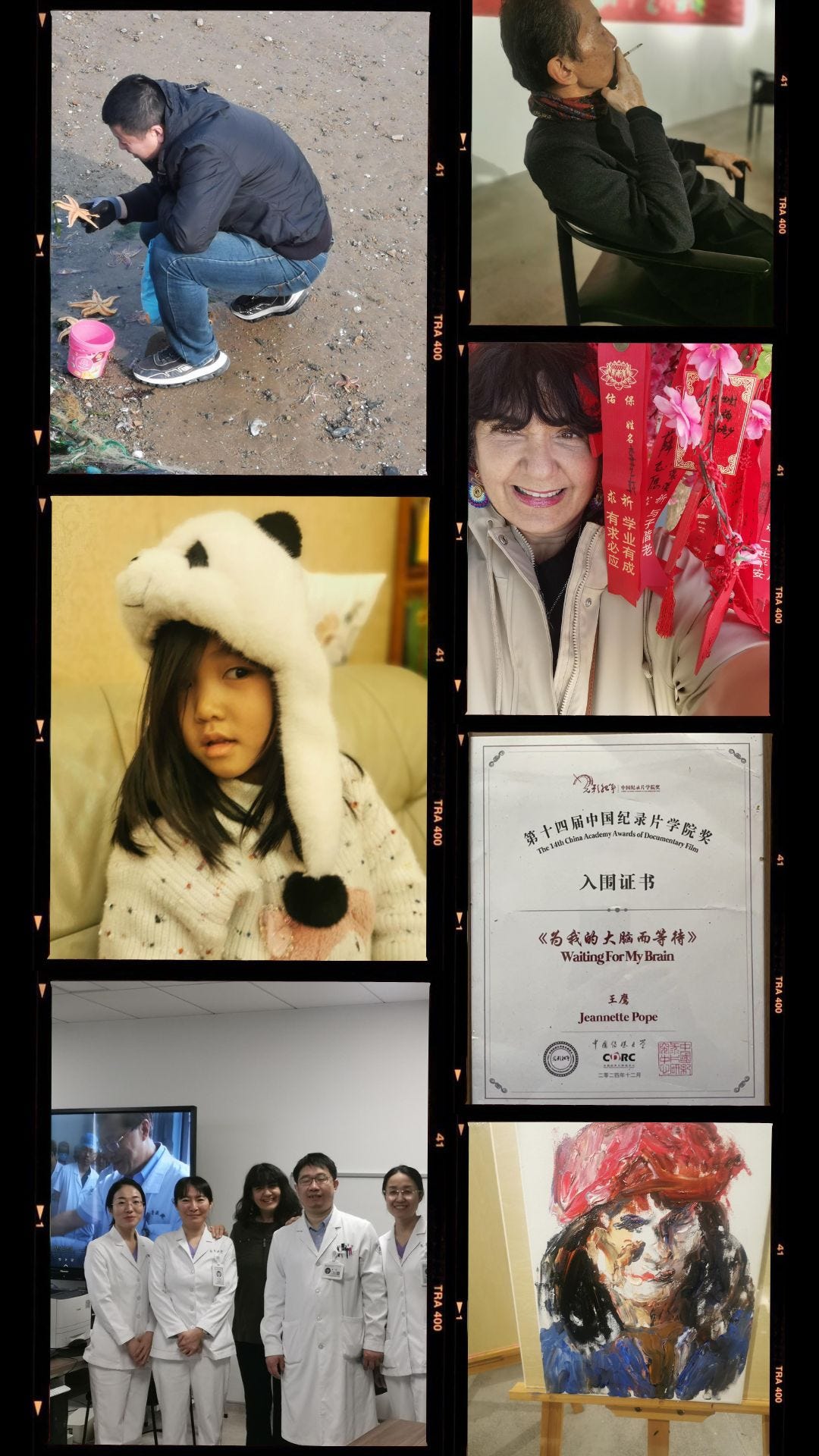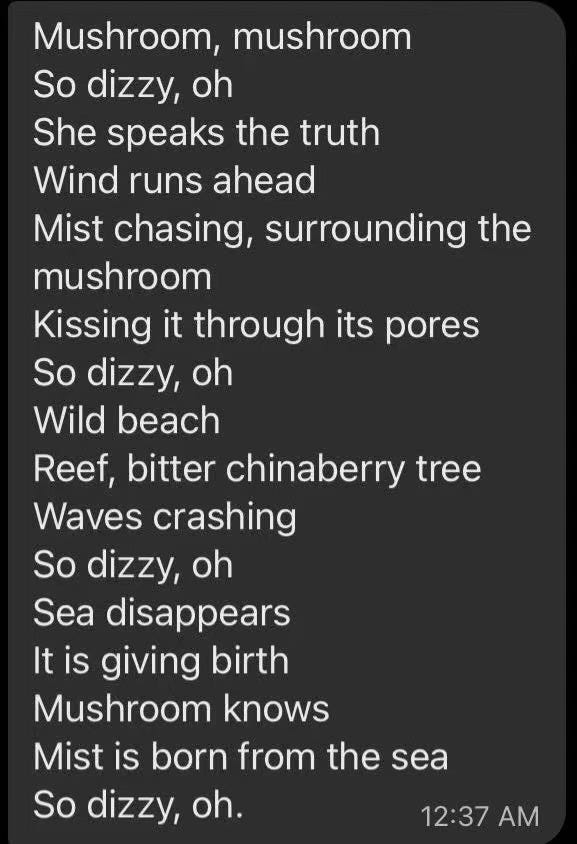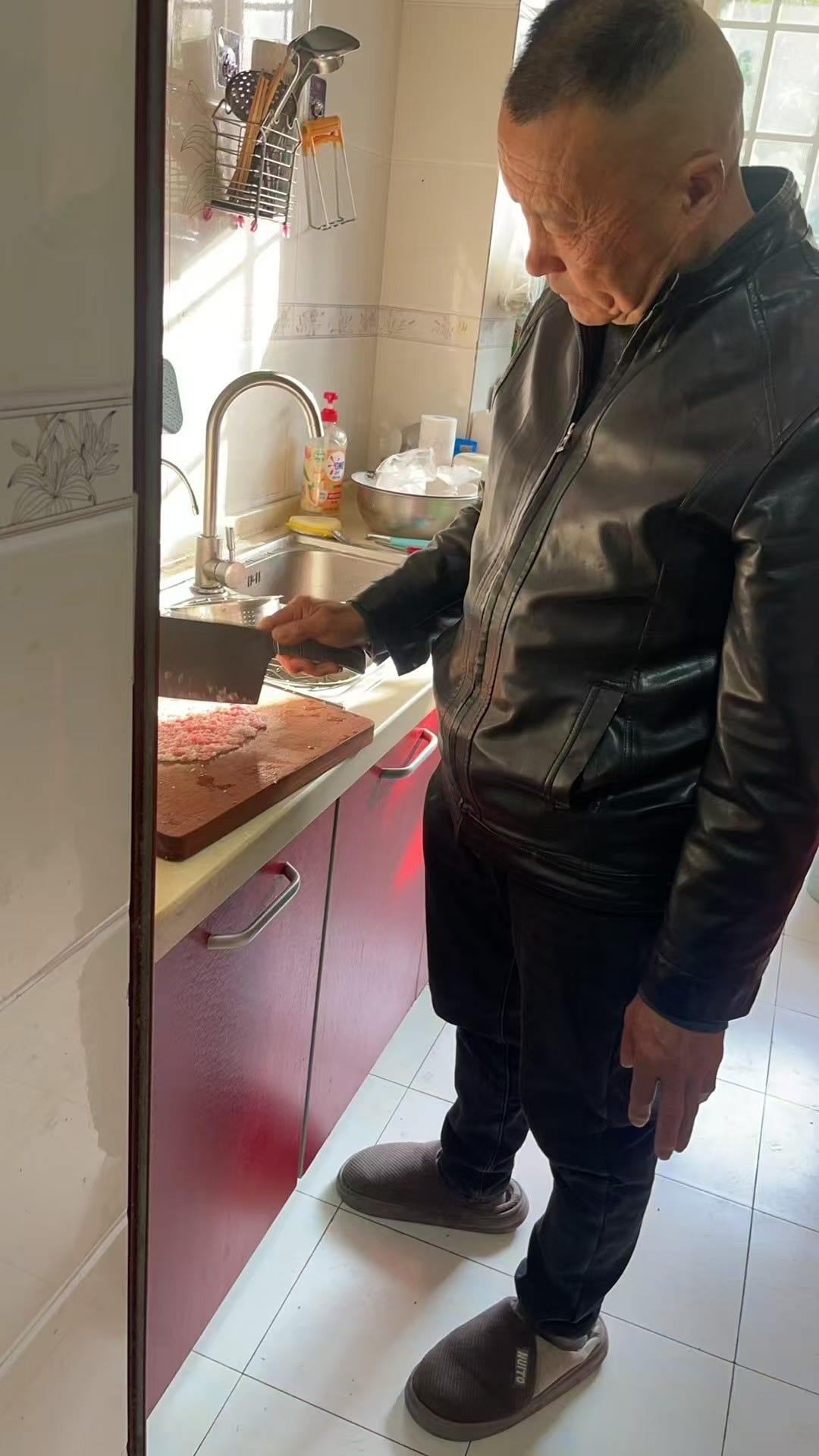
I am trying something different for this Substack. More audio-visual alongside the writing. Something new for the new year!
27th December 2024
I end the year beautifully with a last-minute trip to China.
As I arrive, speeding along in a taxi, we receive the wonderful news, my co-director, Wang Ying, and I, that we had been nominated for an award at the 14th Beijing Documentary Awards for our film, Waiting for My Brain, about my operation. Jet-lagged and ecstatic.
We also have the honour of screening the film in front of the doctors who saved my life at Qilu Hospital, Qingdao. And from here, the trip unfolds like a red carpet of wonder.
Magical.
I reunite with my artist friends, spending a delightful New Year afternoon dancing waltz-tango, being painted, and eating, while an accordion, flute moan and rocker fling deep love notes into the night air.
I have long and precious hours with my godchild, Doado, where one day we walk to the fishing village at the far end of town, to rescue stranded starfish, returning them gently to the sea.
Then, in my second week, Tao phones me.
“Come, come and see me. Please.”
I am travelling through China from Qingdao to Chengdu on the fast train.
I am on my way to meet Tao. Tao my friend, Tao who edits films and looks after his old, very old father.
It is a 12-hour journey.
I am the only foreigner on this train, maybe because it is winter. Why do you travel in the winter? It is the place and time for reflection, on a long train ride, and I like the cold.
The first time I ever came to China in 2012, it was the winter, just before New Year, and it was freezing cold.
I like the cold of China.
People come and people go, a brief meeting with them, then they are gone…
I meet a young man. He is in love, and we speak for hours. I do not film all of it, but some; he is from Xi’an. I feel giddy inside with this feeling; here I am, talking to a young man of 30, who is throwing out his soul to me. He is looking for answers.
I will always remember how he looks at me as we say goodbye, then we hug as he gets off. He is, for these hours, my closest friend in the world.
Country, dry fields, ancestors’ mounds, mountains, mist, fog, into nighttime.
Then, here I am.
I am here!
Here…
And there is Tao, waiting for me…
My dear friend Tao.
I spend hours with Tao observing his world—a tough world where he looks after his father and edits.
At the hotel, I film Tao talking about the art of editing, carving the story. “Forget the technology,” he says. “Find the story. Find the core. Tao edits for Chinese filmmakers. His work is powerful, full of deep energy. “Penetrate to the core, to the soul,” he tells me.” I decide to show this to my learners in their first editing class.
Tao asks me to watch the film he is currently editing. He is dissatisfied—it is directed by a young Chinese woman, Li. She is vain yet beguiling, and her story is complex, almost like a performance piece. She uses her body as Carolee Schneemann did—as a canvas to explore the often unexplored. Through intimate conversations with men, while being made love to or making love, she attempts to erase and liberate herself from the deep trauma of childhood abuse.
I envy the way she displays her youthful body—so effortless, so captivating to watch. Yet, the dots don’t connect. I wonder: is her story turning into a rambling discourse, filled with sexual imagery for gratification? Where is the transformation? How can she find it? Where must she go, as she so obviously wants to go there.
I feel compelled to write to Li, urging her to explore herself differently—to dive deeper so we can sense what she so carefully hides within her soul. She writes back asking me to help her structure her inner voice.
One never knows what will happen in life. I do not expect this, but I am happy to help Li. She is on my mind.
Tao pushes me to think. We talk on street corners, forgetting where we are. I love Tao.
Tao and I met years ago in Montreal, helping each other during dark nights of editing until dawn. I made my film, Where’s Stanley on Stanley Lewis, the Montreal sculptor, while Tao made The Butterfly Dreams.
Now, we continue talking late into the night.
I didn’t come to see the pandas, but to see Tao, under the streetlights.
I now reflect on the very core of my films. Do I reach that core?
We don’t need money to tell a story.
We don’t need the best camera.
We need to tell simply the story.
The rest will follow.
In Tao’s town, Dujiangyan, the deepest blue water gushes, flowing since the Qing dynasty—2,000 years old. The townspeople drink from it, wash in it. Around this blue water, the locals gather. I buy delicious pickles from a family-run shop. Nearby, Tao edited 12 years ago with Fish, a friend from Concordia Film School. Their film won an award at the IDA festival, and Tao’s career as an editor began. His work excites me. He leaves no stone unturned.
This two day journey is not what I expected. But then, is any story what we think it will be? I had no expectations, just to see my friend Tao.
I do not see the pandas, though Chengdu is their home. Instead, I see the mountains and temples. I don’t see the pandas, but I meet Tao’s friends, who are about to leave for Japan. They have just received their visas. They are musicians—young, in love, brave, and determined to be free. I don’t see the pandas, but I see their smiles, watching as they devour food. I don’t see the pandas, but I sit with Tao on an ancient stone while he tells me about his fears, his pain, his love, and his desires.
I visit a mosque. I love the mosques here—full of colour, vibrance, and naïve art. The last time I prayed in a mosque was in Iran, many years ago. I feel a sudden need to sit in the silence. My biological father was Muslim, though I never knew him, only his name. He died when I was a child. This makes me a Muslim. I learnt the first sura of the Quran in Iran when I married there. Suddenly, I think of my husband, Bahram, who died and is buried in Montreal, Canada. I pray for him and for others, while, in the courtyard, they play ping-pong.
When I touch Tao’s Papa’s frail hand and look into his eyes, I notice a flicker of recognition. He used to be an English and Russian translator. I feel his gentle energy—a frail old man lying there. “I am getting old,” he says. Tao tells me he has never said that before.
A carer looks after the father. Tao calls him the Cow— it is not derogatory, just a reference to Chinese astrology. He tells me he has had several animal carers for his father and a Dragon who fell in love and got high blood pressure, became sick and had to go and rest. Tao misses him, “he is a happy Dragon,” he says. Tao makes me laugh. He is a Sheep.
Tao sleeps in his mother’s room, the room where she died. After Mama died, we also slept in her room for months until we sold the house. This room radiates an orange warmth, while the rest of the house is cold—not a sad cold, just the winter cold of an old home.
Looking at Tao’s father in family photos—standing tall, a young man in his prime—and then seeing him now, lying on his bed, unable to walk, a prisoner in his own body, I realise: I still have time.
There is still time to love, to create, to make life meaningful. Never too old, until we are. Then, we turn inward, to the world of dreams.
On the train going back to Qingdao, 12 more hours to think of what has been
We move through tunnels that punctuate the journey. It’s frustrating; I want to capture the entire 12 hours now that the sun finally emerges.
The red plastic bag in front of me bears many sayings. My favourite is: “The stars are not afraid to appear like fireflies.”
We leave the mountains, coming into Xi’an, heading towards the plains. I wonder where my dark eyed lover is, did he find his love, did she answer his calls? Images linger in the fog as the mountains recede behind me. I don’t know when I will return to see Tao again. I cannot say.
I miss him. Life, death, sex and ceremony in two long days that seemed forever.
It feels like Sunday, though it is not. It feels like Sunday because we visit the mountains to honour Tao’s mother at the cemetery. Before though, we eat with Sukie and Pi, Tao’s friends, musicians, the ones who will leave for Japan soon. We eat at a small restaurant at the foot of the mountains. The cover of their first album features the photo of an oyster shell their friend found while mud larking along the River Thames in London last year. I talk about how the Thames is alive with archives and memory. Also, 2,000 years old.
There are birds that fly freely to the mountain tops with a song rising to the end of winter.
China is a young country. My friends here are mostly young—active, vibrant, full of life. Once people are over fifty, many retire to care for their families. But creators don’t retire. I feel young here—ardent, passionate, longing. My spirit walks upright.
In my dreams, I imagine a life here, crossing the plains near Tibet to meet Tao. But I would need to learn more Chinese. I would also need to learn the art of silence.
Sukie tells me the Chinese observe and remain silent till it is time to speak.
Would I ever learn this?
We finally walk up to visit the cemetery where Tao’s mother is buried, high up in the Sleeping Dragon Mountains. My small friend, with a wide and deep heart, carries an inner anguish. He has so much talent and no family except his bedridden father, to whom he clings. He pivots between love and hate, between wanting to leave his father in a home or even killing him. Yet, he does neither. He continues editing in his studio while his father lies in the front room, calling out for a slice of banana or help to the toilet.
The mountain air tastes delicious. Tao carefully washes the stone mausoleum, bringing white and yellow flowers, along with incense. I watch as he performs the ablutions, honouring his mother. He is the only family member left to care for her memory.
She rests, facing beauty on the other side. It is a dignified place, with a spot reserved for his father when the time comes. I tell Tao that I mixed my parents’ ashes together in a ceremony. Now they rest in a large Chinese jar in the bedroom I share with Violette, my granddaughter. She plays around the jar, where Mum and Dad sleep in peace.
There are different ways of loving our ancestors, but the essence is the same.
Train rambles, rattles, singing low it’s metal song.
As we leave the centre-west of China, the sun finally shines brightly. Tao calls me. The Cow-carer—has not made him food. “I now know there’s no one waiting me.” He says. This makes me sob a little. I tell him I love him. He is my friend.
We joke that we are the slow birds who fly first. Our joke we had in the early days of our night editing. One day, Tao will come to live with me and edit for the great French filmmakers. One day.
I feel a twinge of annoyance that the sun didn’t grace me with a clear view of the mountains. Then I hear my dear Montreal friend Penny’s voice: “My darling, don’t you know? Life has a way of getting in the way of life. That’s life.”
At every stop, new faces board, some getting on, others getting off. The journey feels more sober than the one coming here. Or maybe it’s me. I am not the same person I was when I arrived. We never are the same, are we?
I think of Tao’s mum and re listen to the poem he wrote for her.
Tao’s Poem
Two hours pass. Tao calls me again. The Cow has decided to quit. Tao tells me he has posted a desperate notice on WeChat, the Chinese Facebook.
Moments later, Old kind Dragon replies, his blood pressure is better.
“Should I take him back?” Tao asks me.
“Yes, of course,” I say, though I don’t know who this Dragon is, but I do feel a small magic stirring for Tao. He needs magic. Dragons are magical creatures, after all.
And this Dragon loves to sing
HAPPY LUNA YEAR OF THE YIN WOOD SNAKE
Taken from Tao’s neighbourhood








This is very interesting and beautiful, showing us so much about an unfamiliar place and culture. It was a good idea to include more audio-visuals, which really brings the whole thing to life.
As ever I love reading your stories. Your China trip was very spiritual.
Thank you for sharing.